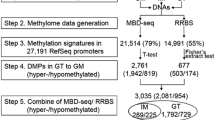Abstract
Background
Somatostatin (SST), a primary inhibitor of gastrin-stimulated gastric acid secretion, has potent antitumor and anti-secretory activity in several human cancers.
Aims
This study was performed to investigate the SST gene expression levels and possible epigenetic mechanisms that regulate expression of SST in gastric adenocarcinomas.
Methods
Quantitative real-time (RT)-PCR and quantitative bisulfite pyrosequencing were used to study primary gastric cancer tissue samples and cell lines.
Results
Quantitative RT-PCR analysis revealed down-regulation of the SST transcript in 93% of gastric carcinoma samples (30/32), compared with 21 normal samples (P < 0.001). Because of the presence of a large CpG island in the SST promoter, we next examined its promoter DNA methylation levels by use of quantitative bisulfite pyrosequencing. The results revealed a significant increase in SST promoter DNA methylation in tumor samples compared with normal samples (P < 0.05). Promoter DNA hypermethylation and silencing of SST was also detected in seven gastric cancer cell lines that we tested. To confirm the role of promoter DNA methylation as an epigenetic mechanism regulating SST expression, AGS gastric cancer cells were treated with 5-Aza-dc. This treatment led to reduction of promoter DNA methylation levels of SST accompanied by restoration of its mRNA expression.
Conclusions
Our results indicate that promoter DNA methylation levels play a critical role in regulating SST expression in gastric cancer. This finding provides a foundation for further studies on the role of SST in gastric carcinogenesis and its potential as a biomarker for gastric cancers.




Similar content being viewed by others
References
Crew KD, Neugut AI. Epidemiology of gastric cancer. World J Gastroenterol. 2006;12:354–362.
Hansson LE, Sparen P, Nyren O. Increasing incidence of carcinoma of the gastric cardia in Sweden from 1970 to 1985. Br J Surg. 1993;80:374–377.
Roder DM. The epidemiology of gastric cancer. Gastric Cancer. 2002;5(Suppl 1):5–11.
Hohenberger P, Gretschel S. Gastric cancer. Lancet. 2003;362:305–315.
Berardi R, Scartozzi M, Galizia E, Cascinu S. Adjuvant chemotherapy in gastric cancer. The italian experience and review of the literature. Suppl Tumori. 2003;2:S45–S47.
Jones PA. Epigenetics in carcinogenesis and cancer prevention. Ann N Y Acad Sci. 2003;983:213–219.
Baylin SB, Ohm JE. Epigenetic gene silencing in cancer—a mechanism for early oncogenic pathway addiction? Nat Rev Cancer. 2006;6:107–116.
Jones PA, Baylin SB. The fundamental role of epigenetic events in cancer. Nat Rev Genet. 2002;3:415–428.
Jin Z, Mori Y, Hamilton JP, et al. Hypermethylation of the somatostatin promoter is a common, early event in human esophageal carcinogenesis. Cancer. 2008;112:43–49.
Mori Y, Cai K, Cheng Y, et al. A genome-wide search identifies epigenetic silencing of somatostatin, tachykinin-1, and 5 other genes in colon cancer. Gastroenterology. 2006;131:797–808.
Liddle RA, Jirtle RL. Epigenetic silencing of genes in human colon cancer. Gastroenterology. 2006;131:960–962.
Reubi JC, Laissue JA. Multiple actions of somatostatin in neoplastic disease. Trends Pharmacol Sci. 1995;16:110–115.
El-Rifai W, Moskaluk CA, Abdrabbo M, et al. Gastric cancers overexpress s100a calcium binding proteins. Cancer Res. 2002;62:6823–6826.
Cameron EE, Bachman KE, Myohanen S, Herman JG, Baylin SB. Synergy of demethylation and histone deacetylase inhibition in the re-expression of genes silenced in cancer. Nat Genet. 1999;21:103–107.
Ou JN, Torrisani J, Unterberger A, et al. Histone deacetylase inhibitor trichostatin a induces global and gene-specific DNA demethylation in human cancer cell lines. Biochem Pharmacol. 2007;73:1297–1307.
Wu LP, Wang X, Li L, et al. Histone deacetylase inhibitor depsipeptide activates silenced genes through decreasing both cpg and h3k9 methylation on the promoter. Mol Cell Biol. 2008;28:3219–3235.
Xiong Y, Dowdy SC, Podratz KC, et al. Histone deacetylase inhibitors decrease DNA methyltransferase-3b messenger rna stability and down-regulate de novo DNA methyltransferase activity in human endometrial cells. Cancer Res. 2005;65:2684–2689.
Yang X, Phillips DL, Ferguson AT, Nelson WG, Herman JG, Davidson NE. Synergistic activation of functional estrogen receptor (er)-alpha by DNA methyltransferase and histone deacetylase inhibition in human er-alpha-negative breast cancer cells. Cancer Res. 2001;61:7025–7029.
Peng DF, Razvi M, Chen H, et al. DNA hypermethylation regulates the expression of members of the mu-class glutathione s-transferases and glutathione peroxidases in Barrett’s adenocarcinoma. Gut. 2009;58:5–15.
Lee OJ, Schneider-Stock R, McChesney PA, et al. Hypermethylation and loss of expression of glutathione peroxidase-3 in Barrett’s tumorigenesis. Neoplasia. 2005;7:854–861.
Deng D, El-Rifai W, Ji J, et al. Hypermethylation of metallothionein-3 cpg island in gastric carcinoma. Carcinogenesis. 2003;24:25–29.
Schneider BG, Peng DF, Camargo MC, Piazuelo MB, Sicinschi LA, Mera R, Romero-Gallo J, Delgado AG, Bravo LE, Wilson KT, Peek RM, Jr., Correa P, El-Rifai W: Promoter DNA hypermethylation in gastric biopsies from subjects at high and low risk for gastric cancer. Int J Cancer. 2010. doi:10.1002/ijc.25274.
Eads CA, Lord RV, Wickramasinghe K, et al. Epigenetic patterns in the progression of esophageal adenocarcinoma. Cancer Res. 2001;61:3410–3418.
Clement G, Braunschweig R, Pasquier N, Bosman FT, Benhattar J. Alterations of the wnt signaling pathway during the neoplastic progression of Barrett’s esophagus. Oncogene. 2006;25:3084–3092.
Acknowledgments
This study was supported by the National Institute of Health grants R01CA93999, UL1 RR024975, and R25CA102209. The contents of this work are solely the responsibility of the authors and do not necessarily represent the official views of the National Cancer Institute or Vanderbilt University.
Author information
Authors and Affiliations
Corresponding author
Additional information
Kaya Jackson, Mohammed Soutto, and DunFa Peng contributed equally to this work.
Rights and permissions
About this article
Cite this article
Jackson, K., Soutto, M., Peng, D. et al. Epigenetic Silencing of Somatostatin in Gastric Cancer. Dig Dis Sci 56, 125–130 (2011). https://doi.org/10.1007/s10620-010-1422-z
Received:
Accepted:
Published:
Issue Date:
DOI: https://doi.org/10.1007/s10620-010-1422-z




